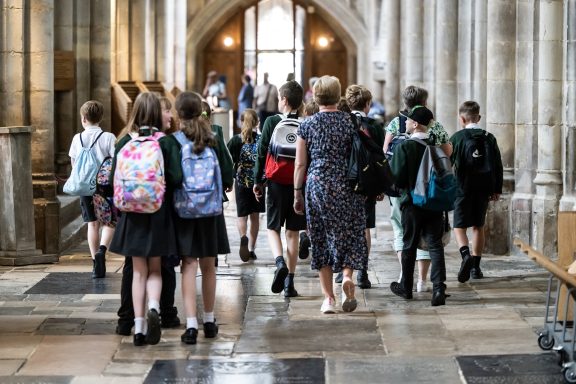There is no national definition for what classes as a small school. The National Association of Small Schools (NASS) suggests it is schools of 100 pupils or less, the Church of England describes a small school as having under 150 pupils. Regardless of the definition, small schools are a wonderful asset to our diocese and offer unique environments where pupils flourish. However, this is not achieved without significant challenge. This page is dedicated to sharing useful information, links and networking opportunities for leaders of diocesan small schools.
If you would like to contribute to the content of this page please contact our Diocesan Deputy Director of Education, Rob Sanders: robert.sanders@portsmouth.anglican.org
Training Opportunities
The Great Big Small Schools INSET Day – 6th January 2025 (Online)
Join colleagues working in small school settings across the country, for a day of thought-provoking discussion about evidence, research and education through a small school lens. This is a joint venture between the Church of England (CEFEL) and the Chartered College of Teaching, open to all types of small primary schools. More details and tickets can be found here (members £14, others £20)
NPQ Small
NPQ Small – NPQ Small programmes are for teachers and leaders in primary schools with under 150 pupils. The Church of England NPQ Small programmes provide a unique opportunity for teachers and school leaders to develop their leadership expertise and, for some schools, are fully funded for September 2024*. Use the link to access the Church of England Foundation for Educational Leadership (CEFEL) website to find out more details.
*Scholarship funding to cover the full NPQ course cost will be available to teachers and leaders from:
- the 50% of schools with the highest proportion of students who attract pupil premium funding
- 16 to 19 educational settings identified as having high disadvantage
Contact CEFEL for more details on whether your school could qualify under these criteria
Networking – contacts
The following Headteachers and Chairs of Governors have offered support and expertise for small school leaders:
Winchester Diocese
| Name | Role | Location | Offers support with…. |
|---|---|---|---|
| Katy Bartlett | Headteacher | East Woodhay, NW Hants | Small school leadership |
| Simon Croutear | Headteacher | New Forest, South | Small school leadership |
| Jo Ayres | Headteacher | Bentworth, Alton | Mental health and well-being, inclusion, mixed age classes |
| Charlotte Baker | Deputy Headteacher | Bentworth, Alton | RE, EYFS, inclusion, mixed age classes |
| Mathew Bowen | Executive Headteacher | New Forest, North | Federations, staffing structures, economies of scale |
| Philip Baylis | Chair of Governors | Dogmersfield, NE Hants | Small school governance |
| Caroline Horrill | Chair of Governors | Sparsholt, Winchester | Marketing, LA perspectives as a councillor, small school governance |
| Ian Hickman | Executive Headteacher | Andover | Federations, executive leadership |
| Peter Christie | Chair of Governors (Federation) | Andover | Federation process, federation governance |
| Anne Moir | Headteacher | New Forest, South | Curriculum design, mixed-age classes, inclusivity |
Portsmouth Diocese
| Name | Role | Location | Offers support with… |
|---|---|---|---|
| Julie Kelly | Headteacher | West Meon | Effective use of teaching assistants, finance, working with organisations such as NASS, NAHT |
| Vickie Farrow | Headteacher | Froxfield | Small school leadership, OFSTED inspections |
| Lou Romans | Headteacher | Steep | Small school leadership |
| Rebecca Lennon | Headteacher | Isle of Wight | Safeguarding, Christian ethos, English, phonics |
| Carla Bradshaw | Chair of Governors (Federation) | Isle of Wight | Governance, finance, admissions, policy framework, HT recruitment, complaints, grievances |
Useful links and research
Schools week article 13 March 2024 – What schools gain from supportive SIAMS inspections
National Association of Small Schools (NASS) – look out for their national conference 3rd/4th Oct 2024
NAHT article – Under pressure: the financial squeeze on small schools in England January 2023
For those that subscribe to The Key, there is a useful publication, ‘The Challenges of Leading a Rural School’, that is worth a read.
OFSTED and SIAMS Inspections
Schools week article 13 March 2024 – What schools gain from supportive SIAMS inspections
Ofsted inspectors to complete training on small schools – at the beginning of February 2024, it was announced that OFSTED inspectors would have to undergo have to undergo new training on understanding small schools before being able to inspect settings with 150 or fewer pupils. The watchdog has said it has developed the training to ensure that its inspectors “make adaptions to their thinking and practice” when visiting smaller schools. Inspectors are also being trained on how to spot signs of distress in headteachers, and have been provided with written guidance on how to pause an inspection if it is thought that a headteacher needs additional support. See TES full article on this subject (February 2024).
